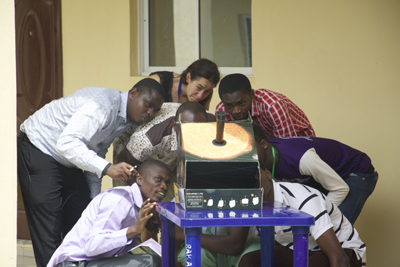Raising a generation of astronomers in Nigeria
(From UBC Science) As Jupiter and Venus completed a dazzling planetary conjunction this month, UBC's Linda Strubbe was wrapping up an astronomical convergence of a different sort under the clear, dark night skies of Nsukka, Nigeria. These projects are creating lots of jobs for developing economies in Africa. We need to make sure there is local expertise so African people can be leaders in research.
Strubbe, a Science Teaching and Learning Fellow with UBC Physics and Astronomy, is working with colleagues from Canada, Germany, Nigeria, Japan and Gabon to organize the second West African International Summer School of Young Astronomers.
“There are lots of students in West Africa who are interested in astronomy and they’d like to be given the opportunity to pursue it,” says Strubbe. “Almost everyone is interested in looking at the sky and understanding our place in the universe.”
The school, held in Nsukka in South-East Nigeria, takes in 50 university students. The hope is that some will discover their passion — some students who participated in the first iteration of the school in 2013 are now doing graduate work in astronomy.
“I learnt that collaboration and team work is very important and necessary for growth as a community, a nation and of humanity,” says current student Ezenwere Emmanuel Ikechukwu. “I learnt how important it is to ask questions, to be curious and inquisitive. I learnt how I can pursue my passion.”
Several major scientific projects are coming to Africa in the coming years and the scientific community wants to ensure that African scientists participate in these international collaborations. The Square Kilometre Array (SKA), a project to build the world’s largest radio telescope, is in the works in South Africa—one of the SKA partner countries (Ghana) is in West Africa.
In Nigeria, the Centre for Basic Space Science is building a 25-m radio telescope to study regions where stars are forming, although funding has delayed the work. Nigeria also has two satellites used for remote sensing.
“These projects are creating lots of jobs for developing economies in Africa. We need to make sure there is local expertise so African people can be leaders in research using the new facilities,” says Strubbe.
But before this can happen, young scientists have to be recruited into the field. At UBC, Strubbe teaches undergraduate physics and astronomy and studies how they learn. She passes those lessons on to other professors who are interested in incorporating new, more effective approaches to learning into their classrooms. Strubbe brings the same expertise to her work with undergraduate and graduate students in Nigeria.
“If you think of the typical university course, a lot of times we give students a set of instructions like ‘do this measurement and compare it to the known value,’ says Strubbe. “But that’s not how scientists work and we want our students to understand how scientists do science.”
In the course, students come up with their own questions to investigate on topics they are interested in. Then they have to come up with their own path for investigating the questions.
Students will spend some of the course using special telescopes to look at the sun. They will see something called a sunspot, a dark patch on the sun caused by cool gas stuck in one place by the sun’s magnetic field. Some students might decide to investigate the question: What are sunspots? Then they have to work together to develop the steps they can take to find out what sunspots are.
The summer students also work in groups to plan how they could teach a topic from the summer school in a high school class back home, then present posters sharing their plans.
The summer school began in 2013 but they had to cancel last year’s program because of the Ebola outbreak. Nigerian astronomer Dr. Bonaventure Okere of the Centre for Basic Space Science at the University of Nigeria, Nsukka, who is now one of the instructors in the program, proposed the idea. He met Strubbe at a conference in 2012 and talked about his ideas for developing astronomy in West Africa. Strubbe jumped at the opportunity to work with him to create the international summer school.
“I’m here because I want to support my colleagues to develop astronomy in West Africa,” she says. “I find it very personally fulfilling to learn how do different people see the world and to learn about what are things that unify us. Astronomy is one of those things.”